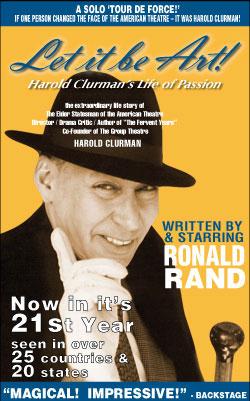Jake Landers
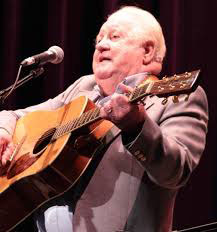 Recognized worldwide as one of Bluegrass music’s finest songwriters, he penned such classics as “Secret of the Waterfall,” “The Girl I Love,” “The Last Request,” and a classic song, with the father of Bluegrass, Bill Monroe, “Walk Softly On My Heart” and “Beyond the Gate.” During the 1960’s, with Herschel Sizemore and Rual Yarbrough, he played for several years as a member of the Dixie Gentlemen. During this time they recorded five albums which contained almost 20 songs either wrote or co-wrote by Landers including “Soldier’s Return,” and “Your Heart Tells The Truth,” In the early 1970’s, Mr. Landers and Mr. Yarborough formed the Dixiemen. During the 1980’s, Mr. Landers formed a group with his daughters becoming the Jake Landers Family Band and recorded for Old Homestead. Mr. Landers has presented an annual Festival of Bluegrass music and more recently, with Mary Settle Cooney and The Ritz Theater, “Bluegrass at the Ritz with Jake Landers and Friends.”
Recognized worldwide as one of Bluegrass music’s finest songwriters, he penned such classics as “Secret of the Waterfall,” “The Girl I Love,” “The Last Request,” and a classic song, with the father of Bluegrass, Bill Monroe, “Walk Softly On My Heart” and “Beyond the Gate.” During the 1960’s, with Herschel Sizemore and Rual Yarbrough, he played for several years as a member of the Dixie Gentlemen. During this time they recorded five albums which contained almost 20 songs either wrote or co-wrote by Landers including “Soldier’s Return,” and “Your Heart Tells The Truth,” In the early 1970’s, Mr. Landers and Mr. Yarborough formed the Dixiemen. During the 1980’s, Mr. Landers formed a group with his daughters becoming the Jake Landers Family Band and recorded for Old Homestead. Mr. Landers has presented an annual Festival of Bluegrass music and more recently, with Mary Settle Cooney and The Ritz Theater, “Bluegrass at the Ritz with Jake Landers and Friends.”
 It was a great delight experiencing “Bluegrass at the Ritz with Jake Landers and Friends.” How did the Festival start and what has it meant for you presenting the singers the groups?
It was a great delight experiencing “Bluegrass at the Ritz with Jake Landers and Friends.” How did the Festival start and what has it meant for you presenting the singers the groups?
It’s been a big thing for me. We used to do a Bluegrass concert festival at the Southgate Mall for a lot of years. It was highly successful; we had bands perform just like at the Ritz. When they closed the mall down, we had to look somewhere else. I went to a show at The Ritz. Mary Settle Cooney was in charge, and afterwards Ms. Mary Settle and I got to talking, and we decided to try a concert festival at The Ritz and it came out pretty good. This recent one was the tenth or twelfth we’ve had there. Ms. Mary Settle has been instrumental in helping keeping that thing going and getting it off the ground.
Is there a way defining what Bluegrass music is. Departures from the traditional instrumentation have included the dobro, accordion, harmonica, piano, autoharp, drums, electric guitar, and electric versions of other common bluegrass instruments, making what’s been referred to as “newgrass.”

Well, I think what bluegrass is has to do with the instrumentation. Bluegrass kind of fits into a certain mold, in that it’s got a certain energy about it, and it tells a story in a lot of cases. But when you put in what’s considered to be country instrumentation, which is a stele and drums and a bass electric guitar, those things make it a country song. A banjo, a mandolin, a bass, guitar and a fiddle - that’s what makes it Bluegrass. Thats my opinion.
 Now I have no objections to what’s considered “new grass.” I fall into the old school of liking Bluegrass that Bill Monroe played, and The Blue Grass Boys, the Osborne Brothers, Jed Crowl. There are newer people in the middle like Carl Jackson and Third Time Out, they kind of settle into the middle, but its still good hard-driving Bluegrass. That’s what I like personally, and thats what my writing has leaned towards.
Now I have no objections to what’s considered “new grass.” I fall into the old school of liking Bluegrass that Bill Monroe played, and The Blue Grass Boys, the Osborne Brothers, Jed Crowl. There are newer people in the middle like Carl Jackson and Third Time Out, they kind of settle into the middle, but its still good hard-driving Bluegrass. That’s what I like personally, and thats what my writing has leaned towards.
Why has it become so important to you to pass on the tradition of Bluegrass music to the next generation?
I don’t want it to die, somebody’s got to keep it going. Tony Robert and Iron Horse, they’re constantly playing it and I hope they will. If its not promoted, supported and played then it will just die. If I can do anything in my power, I will. I have reached the age where I can’t participate as much as I used to, but I’ll keep doing whatever I can
You’re recognized as one of Bluegrass music’s finest songwriters. What led you to write your own songs?
Jake Landers with Herschel Sizemore and Rual Yarbrough
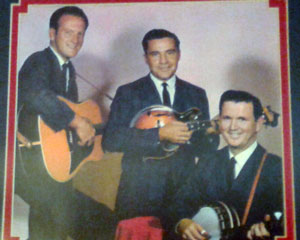 I think people are kind of blessed or slanted in that direction. When I was about fourteen or fifteen, I wrote my first song. It just kind of meshed with me and I wrote another one. Then another one and along the way with Herschel and Real and myself, we did a 45 record. It was the first record we ever did together. I wrote both sides - A side and B side. One was written about dodging my courtship in those days. I wrote one of those later songs for my sweet thing and I wound up marrying her.
I think people are kind of blessed or slanted in that direction. When I was about fourteen or fifteen, I wrote my first song. It just kind of meshed with me and I wrote another one. Then another one and along the way with Herschel and Real and myself, we did a 45 record. It was the first record we ever did together. I wrote both sides - A side and B side. One was written about dodging my courtship in those days. I wrote one of those later songs for my sweet thing and I wound up marrying her.
Now, I don’t start out to write a Bluegrass song. I start out writing a song, it depends how it falls “instrumentation-wise.” I like to think my songs tell a story and they talk about real things real people, real life.
In the early 1970s, you and Real Yarborough formed the Dixiemen, recording four albums. Your song ‘Secret of The Waterfall’ became very popular and was covered with considerable success by the Country Gentlemen. How did that song come about?
Jake Landers with Jane Carpenter
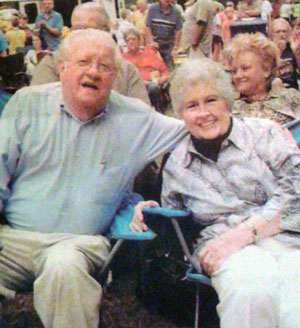 Thats a killing song, where someone kills someone. I wrote that song when my wife went to beauty shop. I didn’t start to write the subject matter, it just evolved. I wrote it all by pencil and paper. It was then typed out and I took the pen and pencil, and put the song in a drawer. I’ve probably put away over a hundred and forty songs in that drawer, a lot of then are unpublished. But I didn’t want my family to lose them so I’ve recorded over a hundred and forty of them on CD’s within the past year.
Thats a killing song, where someone kills someone. I wrote that song when my wife went to beauty shop. I didn’t start to write the subject matter, it just evolved. I wrote it all by pencil and paper. It was then typed out and I took the pen and pencil, and put the song in a drawer. I’ve probably put away over a hundred and forty songs in that drawer, a lot of then are unpublished. But I didn’t want my family to lose them so I’ve recorded over a hundred and forty of them on CD’s within the past year.
As a member of “The Dixie Gentlemen,” when you would write songs, would you go off and write part of the song by yourself or did a lot of it occur when you were together with Herschel Sizemore and Rual Yarbrough?
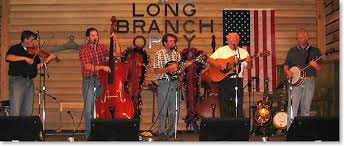
The Jake Landers Band headed by Jake Landers, with Rod Carter,
Jason Wilborn, and Stacy Peek.
I had known Herschel since both of us were in the eighth grade, then he went his separate way and I went mine. After I finished high school, I went into the army. After that, Real and Herschel needed a guitar player and asked me about it, so we played some together and decided that would work pretty good. Originally we were “The Tennessee Valley Boys,” the three of us plus a bass player, then we changed our name to “The Country Gentlemen.” But there was another group that had the same name so we became “The Dixie Gentlemen,” and that seemed to work okay. We kept the name as long as the three of us were together, for about twelve to fourteen years.
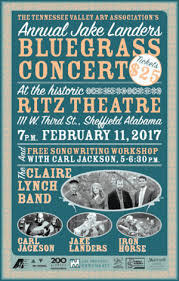 A lot people thought I was the same age as them but they were older than me; I was just a young chicken, sort of speak. Then I formed “The Jake Landers Band,” and that included my two daughters. Wanda died in January, Phyllis is still here. We played a lot together. After they finished college, they had to go their separate ways. I formed another band, and Tony Robertson joined me. All during that time I had been a member of the U.S. Army Reserve. I spent over thirty-seven years in the military — ten and half on active duty, and twenty-seven in the reserve. I endured it. I don’t know how I managed to hang in there with it.
A lot people thought I was the same age as them but they were older than me; I was just a young chicken, sort of speak. Then I formed “The Jake Landers Band,” and that included my two daughters. Wanda died in January, Phyllis is still here. We played a lot together. After they finished college, they had to go their separate ways. I formed another band, and Tony Robertson joined me. All during that time I had been a member of the U.S. Army Reserve. I spent over thirty-seven years in the military — ten and half on active duty, and twenty-seven in the reserve. I endured it. I don’t know how I managed to hang in there with it.
In 1969, Bill Monroe recorded two songs you wrote together: “Walk Softly On My Heart” and “Beyond The Gate.”
I wrote the verses; he had the chorus. I spent five or six months with him, and he and I appreciated it. The Kentucky Freeholders recorded “Walk Softly,” and they did well with it, for him and me too. We wrote the gospel song, “Beyond the Gates, “and another one together about a girl walking in my dreams. That was recorded by Iron Horse and they did a tremendous job with it.
How would describe who Bill Monroe was, and his commitment to Bluegrass music?
What made Bill Monroe was his love of Bluegrass music; he was committed to it. For a long time you could hardly make a living singing bluegrass, back in the late 50’s, early 60’s. When Elvis Presley came along, if anybody would ask Bill about Presley’s version of “Blue Moon in Kentucky,” he would tell them: “I’m always glad to help those people out.” And that was like him.
He was proud and committed to Bluegrass. The reason he was playing “Appalachia-style” music was because he was from the state of Kentucky. It was the Bluegrass state, and he was noted as the “Father of Bluegrass music.” He and I were friends, in a sense, just like me and my next door neighbor are friends. It was really about two people who loved the music, who liked one another and were friends. I thought a lot of him, and I think he did of me too. After we had played a while together, there came a point in time when I couldn’t afford to stay with him playing, there was the necessity of making enough money for my family, so he had to get somebody else to play with.
In the 1980s, when your daughters became involved in music, you formed “The Jake Landers Family Band,” and recorded for Old Homestead.
It was real special. Those two girls really had a special emphasis on the vocal part. That was the real crux of it — their singing. They knew their harmony parts really well and they’d switch parts if they had to. I didn’t have to tell them they just knew when to switch. They were really blessed with the “inside knowledge’ of singing harmony, and they were easy to travel with.
What gives you your greatest strength in life, to wake everyday and make the most of it?
Of course, I’ve been really blessed by the Almighty, in the fact, even though I don’t write songs much anymore, I was still given the talent to write songs and to make music. I don’t really play anymore but I still vocalize. I went down to Birmingham for a showcase with Alabama Bluegrass Association, and Iron Horse. They backed me like they did at The Ritz in Sheffield.
I still enjoy listening to Bluegrass and some country, I like “Fair and Young,” Johnny Paycheck, and people like that Gatlin Boys. They sing a special harmony.
A lot of what I’m hearing has those little things about today becoming yesterday too fast, what is now is not what has been. One thing I find is that people don’t think there’s nothing to writing songs or painting, but in essence there really is — songwriting requires something special; its hard to explain to people. I guess I’m still the most connected to traditional Bluegrass music; I think its part of our roots.•























